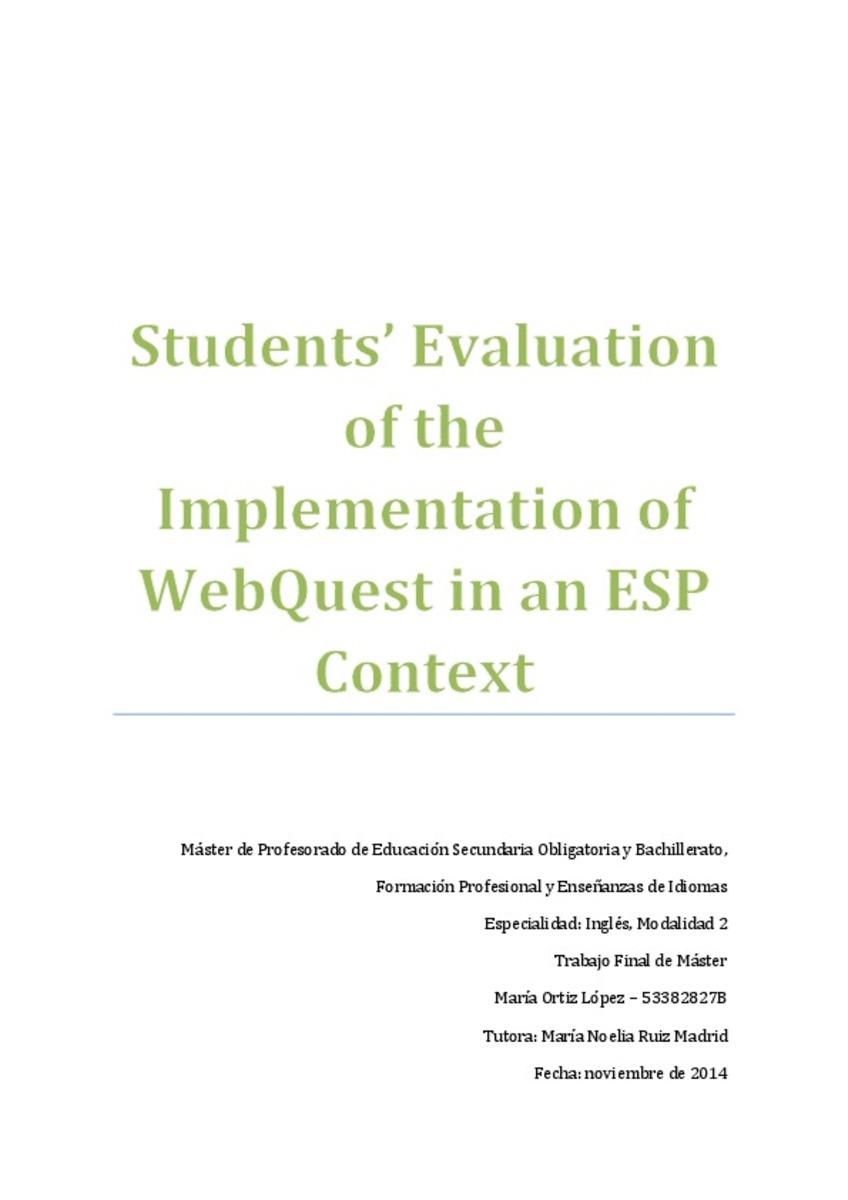| dc.contributor | Ruiz Madrid, María Noelia | |
| dc.contributor.author | Ortiz López, María | |
| dc.contributor.other | Universitat Jaume I. Departament d'Estudis Anglesos | |
| dc.date.accessioned | 2015-02-02T13:26:38Z | |
| dc.date.available | 2015-02-02T13:26:38Z | |
| dc.date.issued | 2014 | |
| dc.identifier.uri | http://hdl.handle.net/10234/113639 | |
| dc.description | Treball Final de Màster Universitari en Professor/a d'Educació Secundària Obligatòria i Batxillerat, Formació Professional i Ensenyaments d'Idiomes. Codi: SAP129. Curs: 2013/2014 | ca_CA |
| dc.description.abstract | Education should be focused on exploring and discovering students’
competences that will allow them to adapt to the society they live in, being
nowadays the society of Information and Communication Technology. We have
changed the way we live, and therefore the way we learn and for that reason,
teachers and education experts should look at the methodology used in schools,
and the teaching and learning tools and resources employed to construct our
knowledge from a different perspective.
This Final Master Thesis, framed within modality 2, deals with the
introduction of the WebQuest methodology within a Business and Administration
vocational course. This study aims at discovering to what extent using WQ
contributes to i) promote students’ positive attitudes towards the ESP learning
process, ii) improve students’ digital competence, and iii) to what extent WQ is a
methodological effective tool in an ESP learning context.
Results obtained lead us to tentative conclusions. It could be deduced that
WQ has contributed to develop students’ positive attitudes towards the ESP
learning process. Group work has been evaluated in a highly positive way. In
addition, students have realised that their digital competence was high but not
transferred to their academic life. Reading skills have also been influenced, since
students dealt with online texts in an academic context, an aspect uncommonly
introduced in the classroom. Finally, the WQ has made students reflect upon the
special features of a specific language, thanks to the guided nature of WQ and the
integration of online dictionaries.
In light of the above, we could conclude that the WQ designed for the purpose
of this study has been considered satisfactory by students. | ca_CA |
| dc.format.mimetype | application/pdf | ca_CA |
| dc.language.iso | eng | ca_CA |
| dc.publisher | Universitat Jaume I | ca_CA |
| dc.rights | Attribution-NonCommercial-ShareAlike 4.0 Spain | * |
| dc.rights.uri | http://creativecommons.org/licenses/by-nc-sa/4.0/ | * |
| dc.subject | Màster Universitari en Professor/a d'Educació Secundària Obligatòria i Batxillerat, Formació Professional i Ensenyaments d'Idiomes | ca_CA |
| dc.subject | Máster Universitario en Profesor/a de Educación Secundaria Obligatoria y Bachillerato, Formación Profesional y Enseñanzas de Idiomas | ca_CA |
| dc.subject | Master's Degree in Secondary Education, Vocational Training and Language Teaching | ca_CA |
| dc.subject | Enseñanza del inglés | ca_CA |
| dc.subject | Tecnología educativa | ca_CA |
| dc.subject | Metodología WebQuest | ca_CA |
| dc.subject.other | Adquisició d'una segona llengua | ca_CA |
| dc.subject.other | Anglès | ca_CA |
| dc.subject.other | Ensenyament assistit per ordinador | ca_CA |
| dc.subject.other | Tecnologia educativa | ca_CA |
| dc.title | Students' evaluation of the implementation of WebQuest in an ESP context | ca_CA |
| dc.type | info:eu-repo/semantics/masterThesis | ca_CA |
| dc.educationLevel | Estudios de Postgrado | ca_CA |
| dc.rights.accessRights | info:eu-repo/semantics/openAccess | ca_CA |










